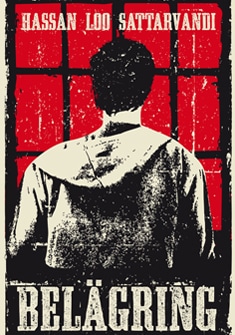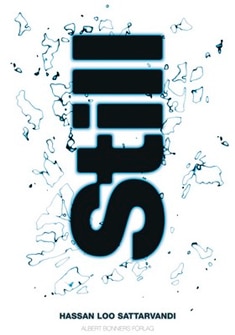
Belägring State Of Siege
An injured boy, a late-night phone call, a day that should never have begun…
State of Siege takes place during a single, critical day in 15-year-old Caspian’s life. An ordinary school day will end in disaster – a crucial confrontation with life's violent nature. Caspian is a boy with a Telemachus complex – a son left behind and living in the shadow of a capricious father’s heroic deeds in faraway lands. But his mother is no Penelope – she is a mentally ill immigrant – and Ithaca is replaced by a gloomy tenement block close to the center of Stockholm but on the periphery of everything else. It is a place under siege, a place where any ambition or desire to leave is harshly punished. With a rhythmic prose and a voice that oscillates between brutal honesty and self-assertive embellishment, Sattarvandi portrays a boy who is trying to become a man in an environment where only bold masculinity is allowed.
Awards
| Shortlisted for the Swedish Radio’s Literature Award Sweden | 2012 |
| Shortlisted for the Vi Literature Prize Sweden | 2011 |
Reviews
-
“In State Of Siege, it's full force when it comes to emotions. A virtual explosion of them. They wind through the book like endless freight trains at night, thumping along the tracks that run through the suburban concrete tenement blocks. In an internal stream of consciousness the protagonist, 15-year-old Caspian, tries to make sense of an accident…as Stockholm's suburban ghetto is portrayed at the same time… We're talking about the ghetto's state of mind, its psychological profile etched into a disillusioned teenager. We're talking about the fatherless society, parental powerlessness and the school system's good intentions and subsequent failure. /…/ Sattarvandi is perfectly in tune with reality. Also with facts. Fiction is used in its most prominent role. To say that which no one dares or is able to formulate as reality. And it's painful along the way. /…/ Caspian's voice has at times an almost cruel authenticity. The story smolders under this layer of words. Which is masterfully done… The title,State Of Siege, says it all. Both as an idea and as an emotional sense of the novel. You can't escape.”
-
“State Of Siege is a breathless, dazzlingly well-written story of a downfall, which illustriously continues the tradition of coming-of-age novels like Jan Guillou's Evil and J.D. Salinger's classic The Cather in the Rye. Breathtakingly harsh and liberatingly unsentimental. Highly recommended.”
-
“Sattarvandi is in prime condition… The novel is constructed as one long, honest, desperate and pacey monologue in the form of a phone call. And that's what carries the reader through the book in what feels like the blink of an eye: the raw prose and the threatening fantasies. The harsh, socially realistic depiction.”
-
“A gravel-infused snowball, flung from a schoolyard smack in your face. That, in a way, is what reading Sattarvandi’s new, linguistically explosive novel feels like. It’s called State of Siege and the title is hardly a coincidence. It is about an existence that appears to be ruled by martial law, and where those who try to escape are immediately beaten down. /…/ [Literature is about] nerve, the author’s drive and perhaps, although not necessarily, conviction. And State Of Siege displays all three. Nerve in particular. /…/ Ultimately, [Sattarvandi] conveys that which he must, in a language necessarily fervent and grinding, and he does it – in the words of Caspian’s naively optimistic teacher – outstandingly well.”
-
“It is skillfully and affectively written, with a feeling of authenticity that is hard to resist. Caspian’s voice forces itself into the head of the reader, as pleading as it is insistent. …State Of Siege is important reading. Not only because it wants to communicate something significant about male coming-of-age and about the mechanisms of alienation and violence, but also for the almost uncanny presence in Sattarvandi’s powerfully driven and mournfully beautiful prose.”
-
“Like so many others, in particular male authors born in the 70s, Sattarvandi occupies himself with rendering the problems and constraints of masculinity. But few do it with such virtuosity. /…/ With State Of Siege, Hassan Loo Sattarvandi verifies that he is a driven stylist able to maintain a tradition in Swedish fiction.”
-
“[The narrator] shifts seamlessly between dark insight, colorful imagination, and poetic passages in which he, half asleep at his school desk, creates his own worlds where he either beats the shit out of his teacher or imagines the stars 'like small, eternal cigarettes that the gods are smoking'. …a single sentence can extend across several pages without punctuation, but there is always rhythm, pace and fervor enough to maintain the flow of reading. Only maternal emotion and political despair forces me to occasionally stop reading.”
-
“This is a novel of rare acuity. /…/ Hassan Loo Sattarvandi has written a monolog from the depths, from within the meaningless and destructive darkness that encompasses the marginalized, those from society rejected, the undesirables. Like a pitch-black mass. A requiem for a life that appears to be doomed before it’s even really started. State Of Siege depicts an existence that is dominated by lies, bullying, sneers, fights and cheap binges, that is permeated by a suffocated and tragic longing for intimacy and love behind a forced façade of misdirected and failed machismo. State Of Siege impresses – impresses greatly – with its literary precision and evocative and absorbing rhythm, but above all with its painful authenticity, its feeling of absolute presence in the alienation of a boy that has already been robbed of his future.”
-
“The reader eavesdrops on [Caspian's] intense, aggressive, crackling poetic stream of consciousness as it approaches its bloody climax – how he gets dragged into a conflict that he has nothing to do with but whose ultimate consequences he must face. It's a story we've heard many times before. But never like this. Sattarvandi tells it with such power and concentration that it rises above its gray social realism-relatives and approaches a mythical level. In fact, there is a whiff of Old Testament and Greek tragedy in this fateful tale, but pared down and concentrated to its very essence. /…/ State Of Siege is in part a conceptual novel. But it is in equal measure a literary and structural innovation. The author has precisely captured the voice of a person in his early teens, and simultaneously made the language sparkle of literature… At times Julio Cortázar comes to mind. There is something about the concentration of the supposed babbling, the vague boundaries between dream and reality, and the constant tangible threat that is reminiscent of the great Argentinian writer's best short stories.”
-
“On these dense, compact pages stand splinters of violence, sorrow and discontent. The raw style, the babbling phone call form, is very handsomely constructed. State Of Siege is a distinctly written, aestheticized text rather than an attempt to imitate colloquial speech. /…/ Just like [Sattarvandi’s] debut, State Of Siege is a novel that tells the story and expresses itself strongly with its form… State Of Siege’s form emulates the hierarchical macho culture that Caspian finds himself in. /…/ This powerful story about violence is an act of brutality in itself.”
-
“The Ivar-Lo Johansson of our time… it’s really all about the vulnerability of being 15 years old and witnessing how the world closes door after door to you. What Sattarvandi achieves in regard to intensity and intimacy, he naturally loses when it comes to portrayal. But. Powerlessness and rage are not always aesthetic acts. Sattarvandi’s State Of Siege is a strong and open story about the reality that is happening while we are busy with something else.”
-
“It is skilled of Sattarvandi to maintain the interest for Caspian's long tale all the way to the end. It is never boring, it is always urgent, and it is not until the very last pages that the reader finds out what has happened, why the ambulances are standing down there by the tracks. It is daring to let a 15-year-old speak so insightfully about himself and his experiences, a quality hardly granted to adults. But if I disregard that and let Caspian's story simply be the furious call for help that it is, well, then it is wonderful, beautiful, sorrowful and a punch to the jaw that rekindles my hope in the power of literature. I can truly feel the swelling lip and dripping blood.”
-
“When Hassan Loo Sattarvandi's debut novel, Still, was published in 2008 it made all other depictions of struggling suburbs suddenly feel like priggish feel-good literature. The rendering wasn’t bursting with literary neologisms, but it had a violent intensity that was completely unique. His new novel, State Of Siege, is just as expressive, the style is manically monotonous and piercingly stressed.”
-
“[The] primary strength of State Of Siege, the toughest, most hopeless and frightening, is perhaps not about language or class warfare, but about explosive and aggressive sexuality. /…/ The depiction of homosociality and machismo culture is State Of Siege's gravitational and emotional cynosure, and is both its most seamless and most interesting theme.”
-
“The novel gives an unrelenting and stirring insight into what it is like to be an outsider, to be young and rootless, to be a victim in an existence that doesn’t leave many options for people on the margins of society… The novel is very skillfully constructed, breathless and very insisting.”
-
“In an absolutely perfectly pitched prose – that is painfully claustrophobic – the story is driven forward, irrevocable as a Greek tragedy, to the inevitable finale, which the reader understands already from the start. It is like Garcia Marquez’ Chronicle of a Death Foretold, but for the far north. /…/ Sattarvandi skillfully constructs [Caspian’s] complexity by way of small, almost imperceptible, literary nuances. Now and then, the energetic youthful slang is fractured by a turn of phrase or an expression that doesn’t at all belong in the isolated monotony of the suburbs, but that opens up to new worlds. This is a Catcher in the Rye for our times, a Holden Caulfield from the tenement blocks.”
-
“Caspian's identity crisis is manifested in his language. It is skillfully done, with small changes in the monologue that shift from the classic hooligan vernacular (which is homophobic, sexist and overtly macho) to more poetic depictions. /…/ Hassan Loo Sattarvandi relates a teenage destiny that is endlessly tragic. He uses the same methods as in [his debut] Still, with sentences that go on and on for an eternity. /…/ It doesn't stop State Of Siege from being a painfully powerful portrayal of someone who is fucked for life. It is a roar from the abyss that extends across 200 pages.”
- Author
-
 Hassan Loo Sattarvandi
Hassan Loo Sattarvandi
- Published
- 2011
- Genre
-
- Literary
- Pages
- 224
- Reading material
Swedish edition
English sample
- Rights sold
-
Czech Republic, Zlin
Denmark, People’s
Sweden, Albert Bonniers
- Film rights sold
-
Sweden, Migma Film
